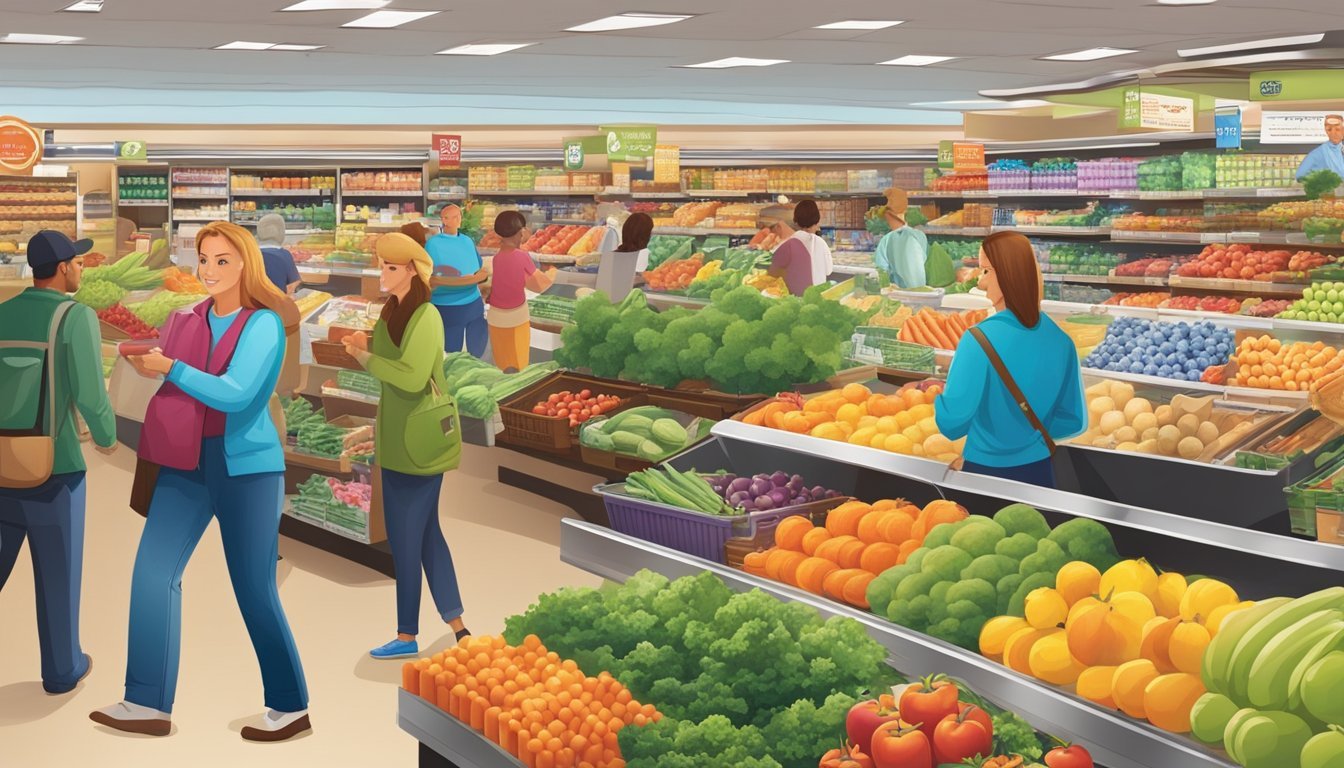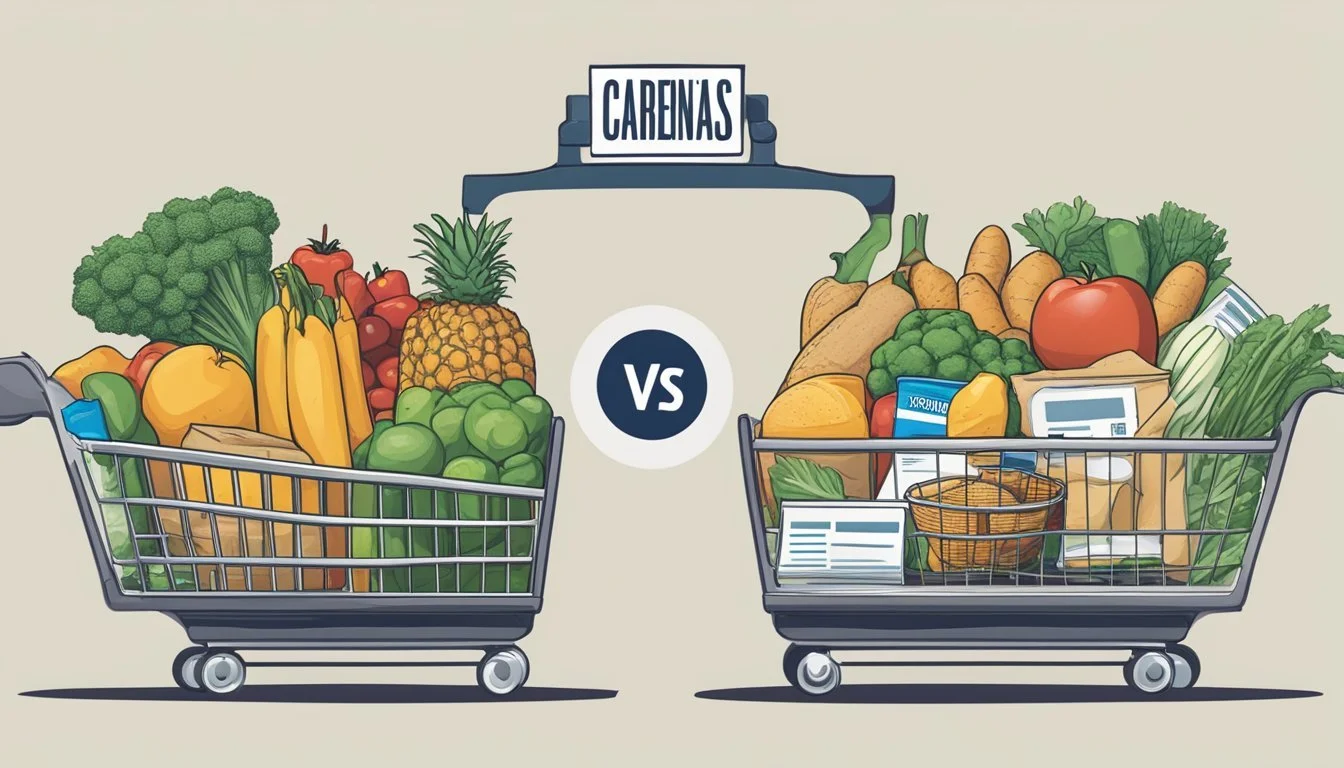Albertsons vs Cardenas Markets
A Comprehensive Comparison of Prices, Selection, and Quality
Albertsons and Cardenas Markets represent two distinct approaches to grocery shopping in the United States. Albertsons, a major national chain, offers a wide selection of mainstream products across its numerous locations. Cardenas Markets, on the other hand, caters specifically to Latino communities with its focus on authentic Hispanic foods and ingredients.
For overall value and selection, Albertsons typically provides better prices and a broader range of products. However, Cardenas Markets excels in offering specialized Latino products and fresh produce that may be harder to find at traditional supermarkets. This makes Cardenas an excellent choice for shoppers seeking specific Hispanic ingredients or those who prioritize cultural authenticity in their grocery shopping experience.
The choice between these two grocery stores ultimately depends on individual preferences and needs. Albertsons may appeal to those seeking convenience and familiar brands, while Cardenas Markets attracts customers looking for a more specialized shopping experience with a focus on Latino cuisine.
Company Overviews
Albertsons and Cardenas Markets are two distinct grocery chains with unique histories and market positions. Albertsons has grown into a major national player through mergers and acquisitions, while Cardenas Markets has focused on serving Hispanic communities in specific regions.
History of Albertsons
Albertsons was founded in 1939 by Joe Albertson in Boise, Idaho. The company expanded steadily over the decades, acquiring several regional chains.
In 2006, Albertsons was split into multiple entities. The grocery business was sold to Supervalu, while the drugstore division became part of CVS.
Albertsons reemerged as a standalone company in 2013 when it was acquired by Cerberus Capital Management. In 2015, Albertsons merged with Safeway, significantly expanding its national footprint.
The company now operates over 2,200 stores under various banners including Albertsons, Safeway, Vons, and Jewel-Osco.
Profile of Cardenas Markets
Cardenas Markets was established in 1981 by Jesús Cardenas Sr. in Ontario, California. The chain specializes in Hispanic grocery items and fresh produce.
Cardenas has grown to over 50 stores across California, Nevada, and Arizona. The company targets Latino shoppers with its product selection and in-store amenities.
In 2016, Cardenas Markets was acquired by private equity firm KKR. This investment has supported the chain's continued expansion in its core markets.
Cardenas differentiates itself with large produce departments, in-store taquerias, and extensive selections of Hispanic foods and brands.
Market Presence and Expansion
Albertsons and Cardenas Markets have distinct approaches to market presence and growth strategies. Albertsons operates on a national scale, while Cardenas Markets focuses on specific regions with a strong Hispanic population.
Albertsons' National Footprint
Albertsons Companies, Inc. is one of the largest food and drug retailers in the United States. The company operates a diverse portfolio of grocery store brands across numerous states. Albertsons' network includes over 2,200 stores and 22 distribution centers.
Its presence extends coast-to-coast, with a particularly strong foothold in the western United States. Major markets include California, Washington, Oregon, and Idaho. Albertsons also maintains a significant presence in Texas, Illinois, and the Mid-Atlantic region.
The company's growth strategy involves both organic expansion and acquisitions. Albertsons has acquired several regional chains over the years to strengthen its market position and enter new territories.
Cardenas Markets' Regional Focus
Cardenas Markets concentrates its operations in the southwestern United States, catering primarily to Hispanic communities. The company operates 52 Cardenas stores and 7 Los Altos Ranch Markets across three states: California, Arizona, and Nevada.
California represents Cardenas Markets' core market, with stores spread throughout southern California and the Central Valley. The chain has a growing presence in the Los Angeles area, including a new store format launched in Whittier.
Cardenas is actively expanding its footprint. In 2023, the company acquired six Rio Ranch Market stores in southern California, bolstering its presence east of Los Angeles. This move demonstrates Cardenas' strategy of targeted growth in areas with significant Hispanic populations.
Phoenix serves as another key market for Cardenas, with multiple locations in the metropolitan area. The company's distribution center in La Habra, California, supports its regional operations and expansion efforts.
Product Selection and Quality
Albertsons and Cardenas Markets offer distinct product selections tailored to different consumer preferences. Their quality standards and exclusive brand offerings shape the shopping experience for customers.
Inventory Comparison
Albertsons provides a broad selection of mainstream American groceries and international foods. The store stocks a wide range of fresh produce, meats, dairy, and pantry staples.
Cardenas Markets specializes in Hispanic and Latin American products. Their inventory includes authentic ingredients, spices, and prepared foods popular in Mexican and Central American cuisines.
Both stores carry fresh fruits and vegetables, but Cardenas often features tropical varieties less common in typical American supermarkets. Albertsons generally has a larger selection of packaged goods and national brands.
Quality Standards
Albertsons maintains quality through partnerships with local and national suppliers. They implement food safety protocols and regular inspections to ensure product freshness.
Cardenas Markets emphasizes authenticity in their product sourcing. They work directly with Latin American producers to import specialty items and maintain cultural accuracy in their offerings.
Both stores adhere to FDA and USDA regulations for food safety and quality. Cardenas may have an edge in the freshness of certain ethnic produce and meats due to their specialized focus.
Exclusive Brands
Albertsons offers several private label brands, including Signature Select and O Organics. These provide value-priced alternatives to national brands across various product categories.
Cardenas Markets features its own line of authentic Latin American products under the Cardenas brand. This includes salsas, tortillas, and other staples of Hispanic cuisine.
The exclusive brands at Albertsons tend to cover a wider range of everyday items. Cardenas' private label focuses more on specialty Hispanic products, giving shoppers unique options not found in mainstream stores.
Pricing Strategies
Albertsons and Cardenas Markets employ distinct pricing approaches to attract and retain customers. Their strategies encompass everyday pricing, promotional offers, and loyalty programs, each tailored to their target demographics and market positioning.
Everyday Pricing
Albertsons adopts a competitive pricing model, aiming to balance quality and affordability. The chain regularly adjusts its prices to stay in line with market trends and competitor offerings. Cardenas Markets, focusing on Hispanic and Latino communities, often provides lower prices on ethnic food items and produce.
Albertsons' pricing tends to be slightly higher on average, reflecting its broader product range and more upscale store environments. Cardenas Markets maintains lower prices on staple items like rice, beans, and fresh produce, catering to budget-conscious shoppers.
Both stores have faced challenges with rising food prices due to inflation. Albertsons has implemented modest price increases across various categories. Cardenas Markets strives to absorb some cost increases to maintain its value proposition for price-sensitive customers.
Promotional Offers
Albertsons runs frequent weekly specials and multi-buy deals. These promotions often feature popular brands and seasonal items. The chain uses digital coupons and personalized offers through its mobile app to drive sales.
Cardenas Markets focuses on culturally relevant promotions, particularly around holidays like Cinco de Mayo or Día de los Muertos. They offer bulk discounts on items commonly used in Hispanic cuisine.
Both stores use loss leaders - deeply discounted items to attract shoppers. Albertsons might feature deals on general grocery items, while Cardenas Markets often promotes fresh produce or meat at very competitive prices.
Loyalty Programs
Albertsons' "Just for U" program provides personalized digital coupons, gas rewards, and exclusive member pricing. The program tracks purchase history to offer tailored deals and accumulate points for future discounts.
Cardenas Markets' loyalty program is more straightforward, offering direct discounts on select items for members. Their focus is on immediate savings rather than point accumulation.
Both programs aim to incentivize repeat visits and larger basket sizes. Albertsons' program tends to offer more diverse rewards, while Cardenas Markets emphasizes simplicity and instant savings on everyday purchases.
Customer Experience
Albertsons and Cardenas Markets offer distinct customer experiences tailored to their target demographics. Both chains prioritize service and convenience, but implement these aspects differently to meet shopper needs.
Service Quality
Albertsons emphasizes efficient service with a focus on quick checkout times. The chain invests in self-checkout options and often has dedicated express lanes for customers with fewer items. Staff receive training in product knowledge to assist with inquiries.
Cardenas Markets takes pride in personalized service, especially in specialty departments. Bilingual employees are common, catering to Spanish-speaking customers. The meat and produce sections typically have knowledgeable staff to provide recommendations and answer questions about preparation methods.
Both stores maintain clean environments, but Cardenas Markets often features vibrant decor reflecting Hispanic culture. This creates a lively atmosphere many customers appreciate.
Shopping Convenience
Albertsons offers a wide range of convenience-focused services. These include:
Online ordering with curbside pickup
Home delivery options
Mobile app for digital coupons and shopping lists
In-store pharmacies at many locations
The chain's larger footprint allows for expansive product selections, including extensive organic and health food options.
Cardenas Markets focuses on convenience through specialized offerings:
In-store tortillerias producing fresh tortillas daily
Hot food counters with ready-to-eat meals
Extensive selection of Hispanic products hard to find elsewhere
Store layouts at Cardenas are often more compact, making quick trips easier for regular shoppers familiar with the layout.
Business Practices and Ethics
Albertsons and Cardenas Markets have distinct approaches to labor relations, sustainability, and community involvement. Their practices reflect different priorities and strategies in these key areas.
Labor Relations
Albertsons employs over 290,000 workers, with many represented by the United Food and Commercial Workers (UFCW) union. The company has faced criticism for labor disputes and store closures affecting employees. In 2022, Albertsons negotiated new contracts with UFCW locals in several regions, including wage increases and improved benefits.
Cardenas Markets, a smaller chain with around 7,000 employees, is not unionized. The company emphasizes internal promotion and career development opportunities for workers. Cardenas offers competitive wages and benefits packages to attract and retain talent in the competitive grocery industry.
Both chains provide employee training programs and safety measures, especially during the COVID-19 pandemic. However, specific policies and worker satisfaction levels may vary between stores and regions.
Environmental Sustainability
Albertsons has set ambitious sustainability goals, aiming to reduce carbon emissions by 47% by 2030. The company focuses on energy efficiency, renewable energy adoption, and reducing food waste. Albertsons has implemented recycling programs and works to minimize packaging waste across its supply chain.
Cardenas Markets has taken steps to reduce its environmental impact, though on a smaller scale. The chain has installed energy-efficient lighting and refrigeration systems in many stores. Cardenas also participates in local recycling initiatives and food donation programs to minimize waste.
Both companies have increased their offerings of organic and locally sourced products, supporting sustainable agriculture practices. However, Albertsons' larger size allows for more extensive sustainability initiatives and reporting.
Community Engagement
Albertsons operates the Albertsons Companies Foundation, which supports various charitable causes. The foundation focuses on hunger relief, education, and health initiatives. Albertsons stores often partner with local food banks and schools for community programs.
Cardenas Markets emphasizes its connection to Hispanic communities. The company sponsors cultural events, supports local schools, and provides scholarships for Latino students. Cardenas also participates in health fairs and nutrition education programs in its store neighborhoods.
Both chains adapted their community engagement during the pandemic, shifting to virtual events and contactless donation drives. Albertsons and Cardenas have each contributed to COVID-19 relief efforts, supporting healthcare workers and vulnerable populations.
Financial Health and Ownership Structures
Albertsons and Cardenas Markets exhibit distinct financial profiles and ownership structures, reflecting their different market positions and growth strategies. These factors significantly impact their operations and long-term sustainability.
Revenue and Profit Analysis
Albertsons, one of the largest grocery chains in the United States, reported annual revenues exceeding $70 billion in recent years. The company has maintained steady profit margins, typically around 1.5-2% of total sales.
Cardenas Markets, while smaller in scale, has shown strong growth. The Hispanic grocery chain's annual revenue is estimated at over $1 billion. Profit figures are not publicly disclosed, but industry analysts suggest healthy margins due to its niche market focus.
Both companies have pursued expansion through acquisitions. Albertsons merged with Safeway in 2015, significantly boosting its market presence. Cardenas has also grown through strategic purchases, acquiring smaller regional chains to expand its footprint.
Ownership and Stock Performance
Albertsons is a publicly traded company listed on the New York Stock Exchange (NYSE: ACI). Its stock has shown moderate performance since its 2020 IPO, with fluctuations tied to market conditions and merger discussions.
Cardenas Markets was previously owned by private equity firm KKR. In 2022, Apollo Funds announced plans to acquire Cardenas, intending to combine it with Tony's Fresh Market. This private ownership structure allows for more flexibility in long-term planning.
Albertsons carries significant debt from past acquisitions, totaling over $8 billion. This debt load impacts its financial flexibility. Cardenas' debt situation is less clear due to its private status, but its recent ownership change suggests potential for new capital infusions.
Legal and Regulatory Considerations
The grocery industry faces significant legal and regulatory scrutiny, particularly regarding mergers and acquisitions. Recent events have highlighted the complex landscape that major supermarket chains must navigate.
Antitrust Issues
The Federal Trade Commission (FTC) closely monitors potential anticompetitive practices in the grocery sector. In February 2024, the FTC filed a lawsuit to block Kroger's $24.6 billion acquisition of Albertsons. This action underscores the agency's concerns about market concentration and its potential impact on consumers.
State attorneys general have also joined the FTC's efforts, expressing worries about reduced competition and higher prices. The proposed merger between two of the largest traditional grocery chains in the U.S. has faced intense regulatory scrutiny since its announcement in October 2022.
Regulatory Compliance
Grocery stores must adhere to strict food safety regulations and labor laws. The FDA and USDA oversee food quality and safety standards, while the Department of Labor enforces wage and hour regulations.
Environmental regulations also play a role, with stores required to manage waste disposal and energy efficiency. Many states have implemented plastic bag bans or fees, forcing grocers to adapt their practices.
Compliance with data privacy laws is increasingly important as stores collect customer information through loyalty programs and online shopping platforms. Failure to meet these regulatory requirements can result in significant fines and reputational damage.
Impact on the Grocery Industry
The Albertsons-Kroger merger proposal has sent shockwaves through the U.S. grocery market. This consolidation could reshape competition dynamics, influence pricing strategies, and alter future market predictions.
Effects on Competition
The potential Albertsons-Kroger merger would create a grocery powerhouse, challenging industry giants like Walmart and Amazon. This consolidation could reduce options for consumers in certain regions. Smaller chains like Sprouts Farmers Market and Fresh Market may face increased pressure to compete.
Analysts predict that regional grocers such as H-E-B and Piggly Wiggly might struggle to maintain market share. The merger could also impact specialty retailers like Whole Foods, forcing them to innovate to retain customers.
Competition from non-traditional players like Costco and Aldi may intensify as they seek to capitalize on any market disruptions.
Influence on Grocery Prices
The merger's impact on grocery prices remains a topic of debate. Some experts argue that increased buying power could lead to cost savings, potentially benefiting consumers. Others warn of potential price hikes due to reduced competition.
Walmart and Amazon's presence in the market may help keep prices in check. These retail giants often set pricing benchmarks that other chains follow.
Regional variations in pricing are likely, with areas seeing less competition potentially experiencing higher costs. Discount chains like Aldi might play a crucial role in maintaining affordable options for budget-conscious shoppers.
Future Market Predictions
Industry analysts foresee continued consolidation in the U.S. grocery market. The Albertsons-Kroger merger could trigger a wave of acquisitions as smaller chains seek to remain competitive.
E-commerce is expected to play an increasingly important role. Amazon's expansion in the grocery sector may prompt traditional retailers to invest heavily in online capabilities.
Experts predict a rise in personalized shopping experiences and loyalty programs. Data-driven insights will likely shape inventory management and pricing strategies.
Sustainability and locally-sourced products are anticipated to gain prominence. Chains focusing on these aspects, like Sprouts Farmers Market, may carve out niche positions in the evolving landscape.
Conclusion
Albertsons and Cardenas Markets cater to different shopper preferences and needs. Albertsons offers a wider selection of mainstream grocery items and national brands. Its larger stores provide one-stop shopping convenience for many consumers.
Cardenas Markets specializes in Hispanic and international foods. It excels in fresh produce, meats, and authentic Latin American products. The smaller stores create a more intimate shopping experience.
Price-conscious shoppers may find better deals at Cardenas, especially on ethnic items. Albertsons typically has more sales and promotions on conventional groceries.
Store locations play a key role in accessibility for customers. Albertsons has a broader geographic presence across the U.S. Cardenas focuses on areas with large Hispanic populations.
Both chains strive to meet evolving consumer demands. Albertsons emphasizes digital integration and delivery options. Cardenas highlights its cultural authenticity and community connections.
Ultimately, the better choice depends on individual shopper priorities. Those seeking familiar brands and expansive selection may prefer Albertsons. Consumers desiring specialized ethnic offerings and a cultural shopping experience may favor Cardenas Markets.










